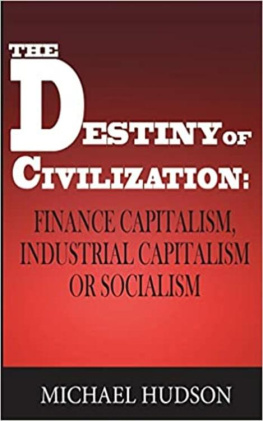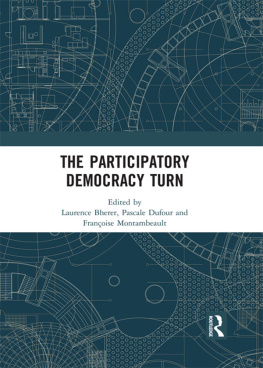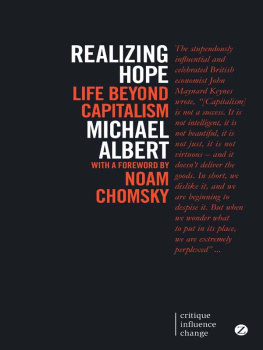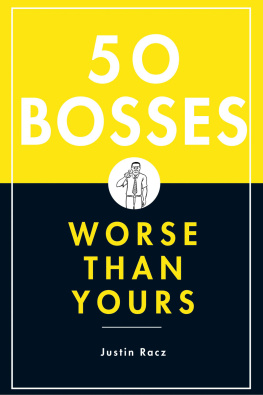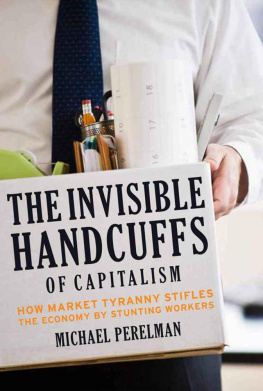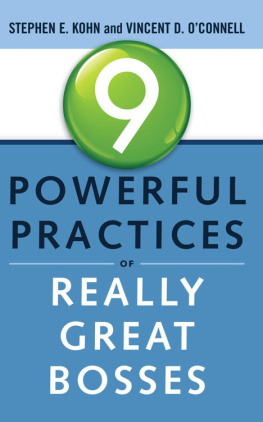Participatory economics has been around for 30 years. Way too many people have contributed directly, much less indirectly, to properly acknowledge them all here. I can only mention those who have literally interacted with drafts of this book, who have contributed to particular formulations that it includes, or who provided a foundation on which it grew.
And with that constraint, I thank Lydia Sargent, who was there every step of the wayuntil now. Robin Hahnel, together with whom I first set out participatory economics and who has worked ever since incredibly productively and insightfully, advocating and refining it, particularly addressing the economics profession. Stephen Shalom, who has been a constant source of insight from the outset and who first developed the ideas that have become known as participatory polity. Cynthia Peters, who has also always been available for advice and correction and who with Lydia Sargent first developed the ideas that have become known as participatory kinship. Justin Podur, another confidant and critic and the initial author of what he liked to call polyculturalism, sometimes called Intercommunalism, sometimes participatory communalism. Peter Bohmer, a powerful ally from the beginning, always wise, always involved in the grassroots, always refining participatory economics as but one part of his multitudinous educational and activist pursuits. And Noam Chomsky. I have no way to tell just how much of participatory economics wouldnt exist without Chomskys example and his impact on myself, on Robin Hahnel, and really on everyone who has played a role in the participatory project. But likely, a whole lot of it.
And, lest these acknowledgments grow too long and my emotional unraveling at writing them grows too intense, my heartfelt thanks collectively goes as well to: Ezequiel Adamovsky, Lonnie Ray Atkinson, Jessica Azulay, Fintan Bradshaw, Jeremy Brecher, Paul Burrows, Leslie Cagan, Sandy Carter, Savvina Chowdhury, Jason Chrysostomou, John Cronan, Ron Daniels, Brian Dominick, Barbara Ehrenreich, Vince Emanuele, Mark Evans, Bill Fletcher Jr., Jerry Fresia, Andrej Grubacic, Todd Jailer, Antti Jauhiainen, Brian Kelly, Kathy Kelly, Mel King, Pat Korte, Joris Leverink, Meaghan Linick Loughly, Mandisi Majavu, David Marty, Daniel Marty, Bridget Meehan, Eugene Nulman, Harpreet Paul, Milan Rai, Nikos Raptis, Paulo Rodriguez, Eric Sargent, Anders Sandstrom, John Schall, Alexandria Shaner, Uruj Sheik, Juliet Shor, Chris Spannos, Nicholas Stylopoulos, Mitchell Szczepanczyk, Brian Tokar, Taylan Tosun, Tom Vouloumanos, Pat Walker, Tom Wetzel, Sean Michael Wilson, Florian Zollmann, and whoever I have managed to unintentionally not name, I hope with no ill effects.
There is another kind of contributor, people who preceded and otherwise never knew the participatory project but whose thoughts played a role in generating the values and commitments at the root of the project. Again the list is too long to present in full, but to not mention the following would feel too wrong to be party to. Mikhail Bakunin, Alexander Berkman, Murray Bookchin, Maurice Brinton, Cornelius Castoriadis, Shulamith Firestone, Emma Goldman, Andre Gorz, Peter Kropotkin, Alexandra Kollantai, Rosa Luxemburg, Anton Pannekoek, Rudolf Rocker, Sheila Rowbotham, Arundhati Roy, and Bertrand Russell.
I am getting older. It happens. So is Robin Hahnel getting older. That happens too. And I would like to thank my younger self and the younger Robin Hahnel and to apologize to each. There are some places in this book that I am pretty sure recirculate only modestly altered prior formulations whose origin I no longer even know. Was it me? Was it Robin? Was it both of us writing together? Was it someone else? Does it matter? I dont think so. I think what matters is whether the proposed economic vision has merit. Can it inform current pursuits? Can it contribute to ultimate aims? I hope it can.

CULTURE, SOCIETY & POLITICS
The modern world is at an impasse. Disasters scroll across our smartphone screens and were invited to like, follow or upvote, but critical thinking is harder and harder to find. Rather than connecting us in common struggle and debate, the internet has sped up and deepened a long-standing process of alienation and atomization. Zer0 Books wants to work against this trend. With critical theory as our jumping off point, we aim to publish books that make our readers uncomfortable. We want to move beyond received opinions.
Zer0 Books is on the left and wants to reinvent the left. We are sick of the injustice, the suffering and the stupidity that defines both our political and cultural world, and we aim to find a new foundation for a new struggle.
If this book has helped you to clarify an idea, solve a problem or extend your knowledge, you may want to check out our online content as well. Look for Zer0 Books: Advancing Conversations in the iTunes directory and for our Zer0 Books YouTube channel.
Popular videos include:
iek and the Double Blackmain
The Intellectual Dark Web is a Bad Sign
Can there be an Anti-SJW Left?
Answering Jordan Peterson on Marxism
Follow us on Facebook at https://www.facebook.com/ZeroBooks and Twitter at https://twitter.com/Zer0Books
Bestsellers from Zer0 Books include:
Give Them An Argument
Logic for the Left
Ben Burgis
Many serious leftists have learned to distrust talk of logic. This is a serious mistake.
Paperback: 978-1-78904-210-8 ebook: 978-1-78904-211-5
Poor but Sexy
Culture Clashes in Europe East and West
Agata Pyzik
How the East stayed East and the West stayed West.
Paperback: 978-1-78099-394-2 ebook: 978-1-78099-395-9
An Anthropology of Nothing in Particular
Martin Demant Frederiksen
A journey into the social lives of meaninglessness.
Paperback: 978-1-78535-699-5 ebook: 978-1-78535-700-8
In the Dust of This Planet
Horror of Philosophy vol. 1
Eugene Thacker
In the first of a series of three books on the Horror of Philosophy, In the Dust of This Planet offers the genre of horror as a way of thinking about the unthinkable.
Paperback: 978-1-84694-676-9 ebook: 978-1-78099-010-1
The End of Oulipo?
An Attempt to Exhaust a Movement
Lauren Elkin, Veronica Esposito
Paperback: 978-1-78099-655-4 ebook: 978-1-78099-656-1
Capitalist Realism
Is There No Alternative?
Mark Fisher
An analysis of the ways in which capitalism has presented itself as the only realistic political-economic system.
Paperback: 978-1-84694-317-1 ebook: 978-1-78099-734-6
Rebel Rebel
Chris OLeary
David Bowie: every single song. Everything you want to know, everything you didnt know.
Paperback: 978-1-78099-244-0 ebook: 978-1-78099-713-1
Kill All Normies
Angela Nagle
Online culture wars from 4chan and Tumblr to Trump.
Paperback: 978-1-78535-543-1 ebook: 978-1-78535-544-8
Cartographies of the Absolute
Alberto Toscano, Jeff Kinkle
An aesthetics of the economy for the twenty-first century.
Paperback: 978-1-78099-275-4 ebook: 978-1-78279-973-3
Malign Velocities
Accelerationism and Capitalism
Benjamin Noys
Long listed for the Bread and Roses Prize 2015, Malign Velocities argues against the need for speed, tracking acceleration as the symptom of the ongoing crises of capitalism.
Paperback: 978-1-78279-300-7 ebook: 978-1-78279-299-4
Meat Market
Female Flesh under Capitalism
Laurie Penny


